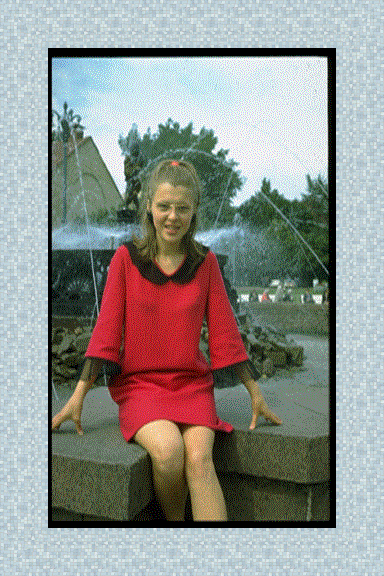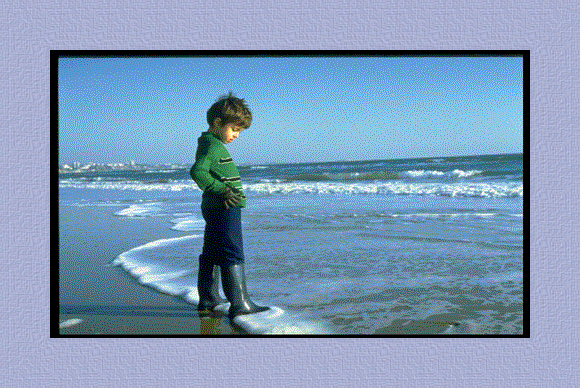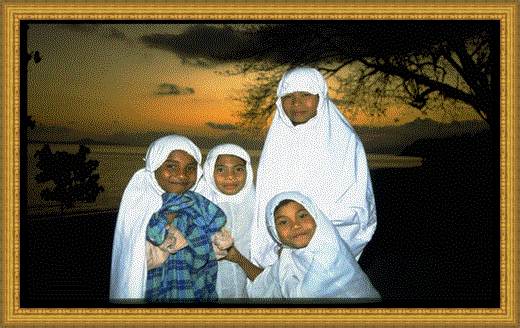I have been shown some things in reference
to our duty to the unfortunate which I feel it my duty to write
at this time.
I saw that it is in the providence of God
that widows and orphans, the blind, the deaf, the lame, and persons
afflicted in a variety of ways, have been placed in close Christian
relationship to His church; it is to prove His people and develop
their true character. Angels of God are watching to see how we
treat these persons who need our sympathy, love, and disinterested
benevolence. This is God's test of our character. If we have
the true religion of the Bible we shall feel that a debt of love,
kindness, and interest is due to Christ in behalf of His brethren;
and we can do no less than to show our gratitude for His immeasurable
love to us while we were sinners unworthy of His grace, by having
a deep interest and unselfish love for those who are our brethren
and who are less fortunate than ourselves.
The two great principles of the law of
God are supreme love to God and
unselfish love to our neighbor. The first four commandments and
the last six hang upon, or grow out of, these two principles.
Christ explained to the lawyer who his neighbor was in the illustration
of the man who was traveling from Jerusalem to Jericho and who
fell among thieves and was robbed and beaten and left half dead.
The priest and the Levite saw this man suffering, but their hearts
did not respond to his wants. They avoided him by passing by
on the other side. The Samaritan came that way, and when he saw
the stranger's need of help he did not question whether he was
a relative or was of his country or creed; but he went to work
to help the sufferer because there was work which needed to be
done. He relieved him as best he could, put him upon his own
beast, and carried him to an inn and made provision for his wants
at his own expense. This Samaritan, said Christ, was neighbor
to him who fell among thieves. The Levite and the priest represent
a class in the church who manifest an indifference to the very
ones who need their sympathy and help. This class, notwithstanding
their position in the church, are commandment breakers. The Samaritan
represents a class who are true helpers with Christ and who are
imitating His example in doing good.
Those who have pity for the unfortunate,
the blind, the lame, the afflicted, the widows, the orphans,
and the needy, Christ represents as commandment keepers, who
shall have eternal life. There is in ----- a great lack of personal
religion and of a sense of individual obligation to feel for
others' woes and to work with disinterested benevolence for the
prosperity of the unfortunate and afflicted. Some have no experience
in these duties. They have all their lives been like the Levite
and the priest, who passed by on the other side. There is a work
for the church to do, which, if left undone, will bring darkness
upon them. The church as a whole and individually should bring
their motives under faithful examination and compare their lives
with the life and teachings of the only correct Pattern. Christ
regards all acts of mercy, benevolence, and thoughtful consideration
for the unfortunate, the blind, the
lame, the sick, the widow, and the orphan as done to Himself;
and these works are preserved in the heavenly records and will
be rewarded. On the other hand, a record will be written in the
book against those who manifest the indifference of the priest
and the Levite to the unfortunate, and those who take any advantage
of the misfortunes of others and increase their affliction in
order to selfishly advantage themselves. God will surely repay
every act of injustice and every manifestation of careless indifference
to and neglect of the afflicted among us. Everyone will finally
be rewarded as his works have been.
I was shown in regard to Brother E that
he has not been dealt justly with by his brethren. Brethren F,
G, and others pursued a course toward him which was displeasing
to God. Brother F had no special interest in Brother E, only
so far as he thought he could advantage himself through him.
I was shown that some looked upon Brother E as being penurious
and dishonest. God is displeased with this judgment. Brother
E would have had no trouble and would have had means to abundantly
sustain himself had it not been for the selfish course of his
brethren who had eyesight and property, and who worked against
him by seeking to turn his abilities to their own selfish interest.
Those who take advantage of the hard study of a blind man and
seek to benefit themselves with his inventions, commit robbery
and are virtually commandment breakers.

There are some in the church who profess
to be keeping the law of Jehovah, but who are transgressors of
that law. There are men who do not discern their own defects.
They possess a selfish, penurious spirit and blind their own
eyes to their sin of covetousness, which the Bible defines as
idolatry. Men of this character may have been esteemed by their
brethren as most exemplary Christians; but the eye of God reads
the heart and discerns the motives. He sees that which man cannot
see in the thoughts and character. In His providence He brings
these persons into positions which will in time reveal the defects
in their character, that if they wish to
see and correct them they can do so. There are some who have
all their lives studied their own interest and been swallowed
up in their own selfish plans and who have been anxious to advantage
themselves without much thought whether others would be distressed
or perplexed by any plans or actions of theirs. Selfish interest
overbears mercy and the love of God. The Lord sometimes permits
this class to go on in their selfish course in spiritual blindness
until their defects are apparent to all who have spiritual discernment
and they evidence by their works that they are not genuine Christians.
Men who have property and a measure of
health, and who enjoy the inestimable blessing of sight, have
every advantage over a blind man. Many ways are open to them
in their business career that are closed to a man who has lost
his sight. Persons enjoying the use of all their faculties should
not look to their own selfish interest and deprive a blind brother
of one iota of his opportunity to gain means. Brother E is a
poor man. He is a feeble man; he is also a blind man. He has
had an earnest desire to help himself, and, although living under
a weight of discouraging infirmities, his affliction has not
dried up the generous impulses of his soul. In his limited circumstances
he has had a heart to do and has done more in the sight of God
for those who were in need of help than many of his brethren
who are blessed with sight and who have a good property. Brother
E has a capital in his business calculation and inventive faculty.
He has worked earnestly with high hopes of inventing a business
by which he might support himself and not be dependent upon his
brethren.
I wish that we might all see as God sees.
I wish all could realize how God looks upon those men who profess
to be followers of Christ, who have the blessing of sight and
the advantage of means in their favor, and who yet envy the little
prosperity enjoyed by a poor blind man and would benefit themselves,
increase their stock of means, at the disadvantage of their afflicted
brother. This is regarded of God as the most criminal selfishness
and robbery, and is an aggravating sin, which He will surely
punish. God never forgets. He does
not look upon these things with human eyes and with cold, unfeeling,
human judgment. He views things, not from the worldling's standpoint,
but from the standpoint of mercy, pity, and infinite love.
Brother H tried to help Brother E, but
not with unselfish motives. At first his pity was excited. He
saw that Brother E needed help. But soon he lost his interest,
and selfish feelings gathered strength, until the course of his
brethren resulted in Brother E's being disadvantaged rather than
benefited. These things have greatly discouraged Brother E and
have had a tendency to shake his confidence in his brethren.
They have resulted in involving him in debts which he could not
pay. As he has realized the selfish feelings exercised toward
him by some of his brethren, it has grieved him and sometimes
stirred him. His feelings at times have been almost uncontrollable
as he has realized his helpless condition, without sight, without
means, without health, and with some of his brethren working
against him. This has added greatly to his affliction and told
fearfully upon his health.
I was shown that Brother E has some good
qualities of mind which would be better appreciated if he had
greater power of self-control and would not become excited. Every
exhibition of impatience and fretfulness tells against him, and
is made the most of by some who are guilty of much more grievous
sins in the sight of God, Brother E's principles are good. He
has integrity. He is not a dishonest man. He would not knowingly
defraud any man. But he has faults and sins which must be overcome.
He, as well as other men, has to deal with human nature. He is
too often impatient and is sometimes overbearing. He should cherish
a more kindly, courteous spirit and should cultivate gratitude
of heart toward those who have felt an interest in his case.
Naturally he has an impetuous temper when suddenly aroused or
unreasonably provoked. But, notwithstanding this, he has a heart
to do right, and he feels sincere repentance toward God when
he reflects upon his wrongs.
If he sees his brethren inclined to do
him justice he will be generous
to forgive and humble enough to desire peace, even if he has
to make great sacrifices to obtain it. But he is easily excited;
he is of a nervous temperament. He has need of the subduing influence
of the Spirit of God. If those who are ready to censure him would
consider their own wrongs and kindly overlook his faults as generously
as they should, they would manifest the spirit of Christ. Brother
E has a work to do to overcome. His words and deportment to others
should be gentle, kind, and pleasant. He should strictly guard
against everything which savors of a dictatorial spirit or of
overbearing manners or words.
While God is a friend to the blind and
the unfortunate, He does not excuse their sins. He requires them
to overcome and to perfect Christian character in the name of
Jesus, who overcame in their behalf. But Jesus pities our weakness,
and He is ready to give strength to bear up in trial and to resist
the temptations of Satan, if we will cast our burden upon Him.
Angels are sent to minister to the children of God who are physically
blind. Angels guard their steps and save them from a thousand
dangers, which, unknown to them, beset their path. But His Spirit
will not attend them unless they cherish a spirit of kindness
and seek earnestly to have control over their natures and to
bring their passions and every power into submission to God.
They must cultivate a spirit of love and control their words
and actions.
I was shown that God requires His people
to be far more pitiful and considerate of the unfortunate than
they are. "Pure religion and undefiled before God and the
Father is this, To visit the fatherless and widows in their affliction,
and to keep himself unspotted from the world." Here genuine
religion is defined. God requires that the same consideration
which should be given to the widow and fatherless be given to
the blind and to those suffering under the affliction of other
physical infirmities. Disinterested benevolence is very rare
in this age of the world.

I was shown, in Brother E's case, that
those who would in any way deal unjustly with him and discourage
him in his efforts to help himself,
or who, coveting the poor blind man's prosperity, would advantage
themselves to his disadvantage, will bring upon themselves the
curse of God, who is the blind man's friend. Special injunctions
were given to the children of Israel in reference to the blind:
"Thou shalt not defraud thy neighbor, neither rob him: the
wages of him that is hired shall not abide with thee all night
until the morning. Thou shalt not curse the deaf, nor put a stumbling
block before the blind, but shalt fear thy God: I am the Lord.
Ye shall do no unrighteousness in judgment: thou shalt not respect
the person of the poor, nor honor the person of the mighty: but
in righteousness shalt thou judge thy neighbor." "Cursed
be he that removeth his neighbor's landmark. And all the people
shall say, Amen. Cursed be he that maketh the blind to wander
out of the way. And all the people shall say, Amen. Cursed be
he that perverteth the judgment of the stranger, fatherless,
and widow. And all the people shall say, Amen."
It is strange that professed Christian
men should disregard the plain, positive teachings of the word
of God and feel no compunctions of conscience. God places upon
them the responsibility of caring for the unfortunate, the blind,
the lame, the widow, and the fatherless; but many make no effort
to regard it. In order to save such, God frequently brings them
under the rod of affliction and places them in positions similar
to those occupied by the persons who were in need of their help
and sympathy, but who did not receive it at their hands.
God will hold the church at ----- responsible,
as a body, for the wrong course of its members. If a selfish
and unsympathizing spirit is allowed to exist in any of its members
toward the unfortunate, the widow, the orphan, the blind, the
lame, or those who are sick in body or mind, He will hide His
face from His people until they do their duty and remove the
wrong from among them. If any professing the name of Christ so
far misrepresent their Saviour as to be unmindful of their duty
to the afflicted, or if they in any way seek to advantage themselves
to the injury of the unfortunate and
thus rob them of means, the Lord holds the church accountable
for the sin of its members until they have done all they can
to remedy the existing evil. He will not hearken to the prayer
of His people while the orphan, the fatherless, the lame, the
blind, and the sick are neglected among them.
There is more meant by "being on the
Lord's side" than merely saying so in meeting. The Lord's
side is ever the side of mercy, pity, and sympathy for the suffering,
as will be seen by the example given us in the life of Jesus.
We are required to imitate His example. But there are some who
are not on the Lord's side in regard to these things; they are
on the side of the enemy. In giving to His hearers an illustration
of this subject, Jesus said:
"Inasmuch as ye have done it unto
one of the least of these My brethren, ye have done it unto Me.
Then shall He say also unto them on the left hand, Depart from
Me, ye cursed, into everlasting fire, prepared for the devil
and his angels: for I was anhungered, and ye gave Me no meat:
I was thirsty, and ye gave Me no drink: I was a stranger, and
ye took Me not in: naked, and ye clothed Me not: sick, and in
prison, and ye visited Me not. Then shall they also answer Him,
saying, Lord, when saw we Thee anhungered, or athirst, or a stranger,
or naked, or sick, or in prison, and did not minister unto Thee?
Then shall He answer them, saying, Verily I say unto you, Inasmuch
as ye did it not to one of the least of these, ye did it not
to Me. And these shall go away into everlasting punishment: but
the righteous into life eternal."
Here in His sermon Christ identifies Himself
with suffering humanity and plainly impresses upon us all that
indifference or injustice done to the least of His saints is
done to Him. Here is the Lord's side, and whoever will be on
the Lord's side, let him come over with us. The dear Saviour
is wounded when we wound one of His humble saints.
Righteous job moans because of his afflictions
and pleads his own cause when unjustly accused by one of his
comforters. He says: "I was eyes to the blind, and feet
was I to the lame. I was a father
to the poor: and the cause which I knew not I searched out. And
I brake the jaws of the wicked, and plucked the spoil out of
his teeth."
The sin of one man discomfited the entire
army of Israel. A wrong course pursued by one toward his brother
will turn the light of God from His people until the wrong is
searched out and the cause of the oppressed is vindicated. God
requires His people to be tender in their feelings and discriminations,
while their hearts should be enlarged, their feelings should
be broad and deep, not narrow, selfish, and penurious. Noble
sympathy, largeness of soul, and disinterested benevolence are
needed. Then can the church triumph in God. But just as long
as the church suffer selfishness to dry up kindly sympathy and
tender, thoughtful love and interest for their brethren, every
virtue will be corroded. Isaiah's fast should be studied and
close self-examination made with a spirit to discern whether
there is in them the principles which God's people are required
to possess in order that they may receive the rich blessings
promised.
God requires that His people should not
allow the poor and afflicted to be oppressed. If they break every
yoke and release the oppressed, and are unselfish and kindly
considerate of the needy, then shall the blessings promised be
theirs. If there are those in the church who would cause the
blind to stumble, they should be brought to justice; for God
has made us guardians of the blind, the afflicted, the widows,
and the fatherless. The stumbling block referred to in the word
of God does not mean a block of wood placed before the feet of
the blind to cause him to stumble, but it means much more than
this. It means any course that may be pursued to injure the influence
of their blind brother, to work against his interest, or to hinder
his prosperity.

A brother who is blind and poor and diseased,
and who is making every exertion to help himself that he may
not be dependent, should be encouraged by his brethren in every
way possible. But those who profess to be his brethren, who
have the use of all their faculties, who are
not dependent, but who so far forget their duty to the blind
as to perplex and distress and hedge up his way, are doing a
work which will require repentance and restoration before God
will accept their prayers. And the church of God who have permitted
their unfortunate brother to be wronged will be guilty of sin
until they do all in their power to have the wrong righted.
All are doubtless familiar with Achan's
case. It is recorded in sacred history for all generations, but
more especially for those upon whom the ends of the world are
come. Joshua lay moaning upon his face before God because the
people were obliged to make a disgraceful retreat before their
enemies. The Lord bade Joshua arise: "Get thee up; wherefore
liest thou thus upon thy face?" Have I humbled without cause
by removing My presence from thee? Does God forsake His people
without a cause? No; He tells Joshua that there is a work for
him to do before his prayer can be answered. "Israel hath
sinned, and they have also transgressed My covenant which I commanded
them: for they have even taken of the accursed thing, and have
also stolen, and dissembled also." He declares: Neither
will I be with you any more, except ye destroy the accursed from
among you."
Here in this example we have some idea
of the responsibility resting upon the church and the work that
God requires them to do in order to have His presence. It is
a sin in any church not to search for the cause of their darkness
and of the afflictions which have been in the midst of them.
The church in ----- cannot be a living, prosperous church until
they are more awake to the wrongs among them, which hinder the
blessing of God from coming upon them. The church should not
suffer their brethren in afflict on to be wronged. These are
the very ones that should awaken the sympathy of all hearts and
call into exercise noble, benevolent feelings from all the followers
of Christ. The true disciples of Christ will work in harmony
with Him and, following His example will help those who need
help. Brother E's blindness is
a terrible affliction, and all should seek to be eyes for the
blind and thus make him feel his loss as little as possible.
There are some who improve their eyes by watching opportunities
to work for their own advantage to get gain, but God may bring
confusion upon them in a manner they do not expect.
If God in His mercy has given the blind
man inventive faculties that he can use for his own good, God
forbid that anyone should grudge him this privilege and rob him
of the benefits he might derive from God's gift to him. The blind
man has disadvantages to meet on every side in the loss of his
sight. That heart in which pity and sympathy are not excited
at seeing a blind man groping his way in a world clothed to him
in darkness, is hard indeed and must be softened by the grace
of God. Not a face can the blind man look upon and there read
kindly sympathy and true benevolence. He cannot look upon the
beauties of nature and trace the finger of God in His created
works. Their cheering gladness does not speak to him to comfort
and to bless when despondency broods over him. How quickly would
he exchange his blindness and every temporal blessing for the
blessing of sight. But he is shut up to a world of darkness,
and his God-given rights have been trampled upon that others
might get gain.
